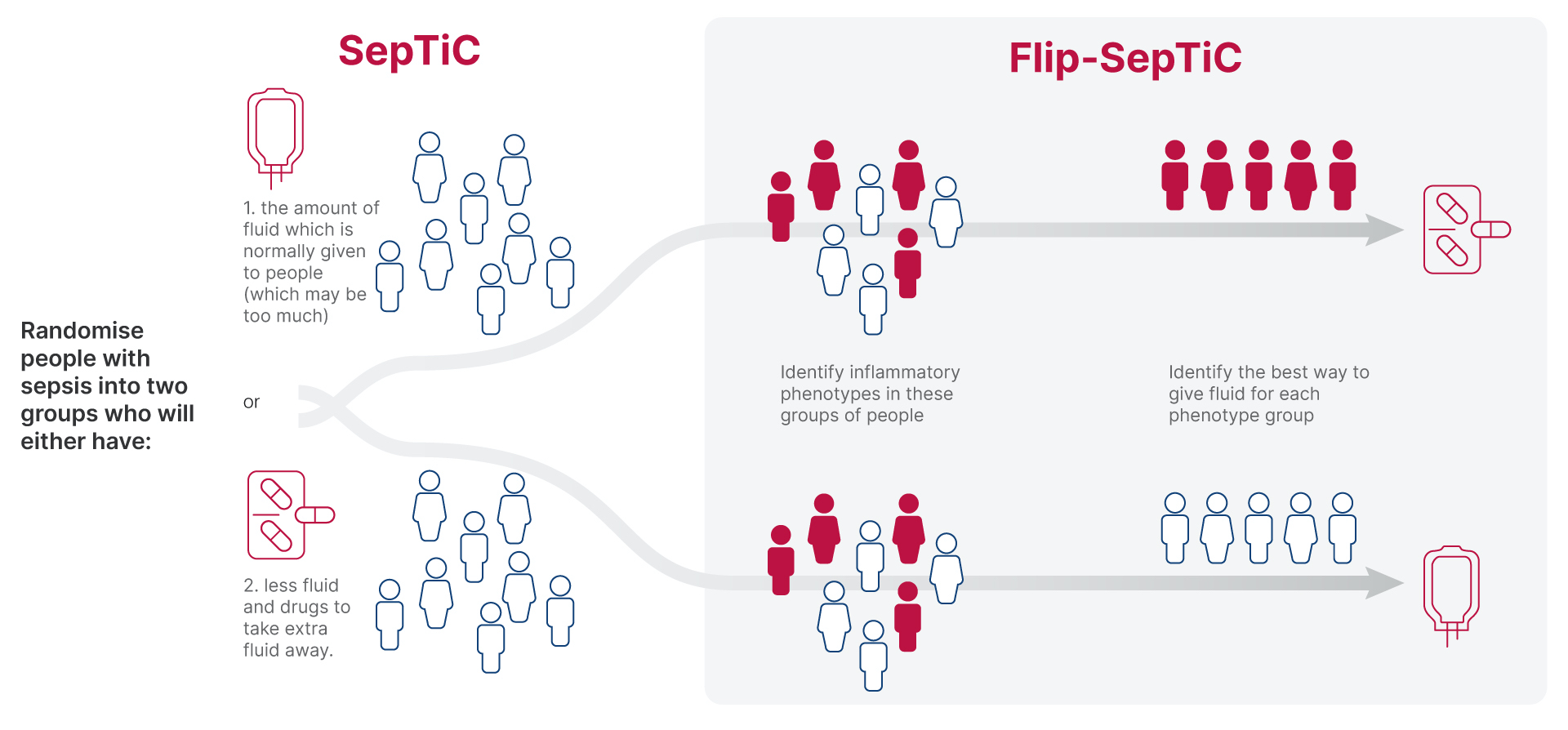FLIP SepTiC research trial.
FLIP SepTiC stands for FLuid strategies and Inflammatory Phenotypes in the SepTiC trial.
What does FLIP SepTiC mean?
This is an embedded mechanistic study, which means it happens as part of the SepTiC trial and helps us get a better understanding of how the trial treatments work and which people they may work best in. Phenotypes are groups of people with a disease, like sepsis, where the illness behaves in a similar way. A single disease may contain many different phenotypes that respond differently to treatments.
What do we want to test in this study?
Sepsis involves inflammation, which means that the immune system overreacts to infection and releases chemicals to fight off infection and heal damaged tissue. The amount of inflammation varies between people with sepsis.
People with sepsis need to be given fluid (usually salt water) through their veins to ensure enough blood supply to organs, like the kidneys. Too much fluid and not enough fluid might both be harmful, but there has not been enough research to know what the right amount is.
In the main SepTiC trial, we are looking at two ways to give fluid to see which is better:
1) The amount of fluid which is normally given to people (which may be too much) 2) Or using less fluid and giving drugs to take extra fluid away from people’s bodies. Research shows that people with severe lung damage, many of whom have sepsis, respond differently to these two fluid approaches, depending on how much inflammation they had. Patients with more inflammation were more likely to live if they had more fluid. But people with less inflammation, were more likely to live if they had less fluid.
In FLIP- SepTiC, we will look to see if patients with sepsis in the SepTiC trial will respond differently to the two fluid approaches depending on how much inflammation they have.
How will we do this research?
We will collect a blood sample from 3000 patients in the SepTiC trial when they join the study. From these samples we will measure nine chemicals called cytokines that cause inflammation.
We will put these tests together with information that is normally collected from people who are being treated in hospital, for example, blood test results and measurements like blood pressure.
Then a mathematical approach called ‘latent class analysis’ will be used to separate patients into groups using all this information. People who have severe infection can sadly die so we will look to see how people in each group responded to being given standard amounts or less fluid in terms of survival at ninety days.
Understanding if different groups of people respond differently to these treatments is important so that doctors know the best way to treat people with sepsis.

Who is funding this research?
FLIP-SepTiC is funded by the National Institute of Health and Care Research (NIHR) Research Efficacy and Mechanism Evaluation Programme, a Medical Research Council and NIHR partnership.
This project NIHR153209 is funded by the Efficacy and Mechanism Evaluation (EME) Programme, an MRC and NIHR partnership. The views expressed in this publication are those of the author(s) and not necessarily those of the MRC, NIHR or the Department of Health and Social Care.

Who is leading this research?
The FLIP-SepTiC co-investigators are:
Professor Anthony Gordon (Imperial College London)
Professor Manu Shankar-Hari (University of Edinburgh)
Professor Danny McAuley (Queen’s University, Belfast)
Dr Jon Silversides (Queen’s University, Belfast)
Dr Leila Janani (Imperial Clinical Trials Unit).

Dr David Antcliffe
Dr David Antcliffe (Clinical Senior Lecturer and Honorary Consultant in Critical Care, Imperial College London is Chief Investigator for FLIP-SepTiC.
